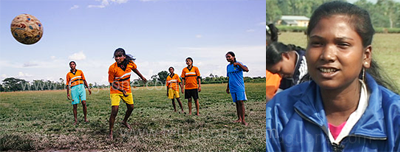
As a 7 year old Bhabani Munda dreamt of playing football. In the tea garden labour quarters of West Bengal's Dooar region where girls worked in the fields and were married off at an early age she turned out to be someone different and has been quietly challenging the social norms in West Bengal's hilly tea estates since the 1990s, when she got together with a few friends to form the area's first women's soccer team. A player Munda wanted to do something for uplifting the local girls who, as often is the case in India, lag behind males economically and socially.
It was not easy to convince her own parents as Bhabani told where she was stopped from playing football by her own parents and brothers and was locked up in the house. But she would sneak out early in the morning and finish her chores and run off to play at 3:30 in the morning and formed her team. She has become an inspiration in an area where girls are usually sent to work in the tea estates as children, then married off young, but with guts and instinct she has not only changed her own life but also the others girls in her neighborhood.
Eventually, Munda started Dooars XI (dooars means doors and is also the name of the Himalayan foothills) — and went head-to-head with old narrow-mindedness. The first challenge she faced was getting permission from the parents to allow their daughters to play. The second: persuading the parents that the girls should play in shorts. "I wore shorts to convince them it was not that scandalous," she says. The villagers called her "brazen" and "shameless." She later moved out of her family home when her brothers locked her up to dissuade her from playing in a tournament.
Bhabani leads a feisty team of 11 that despite no coach, with just one set of jersey and two footballs, boasts of players who've played state level and won numerous trophies. "Women's place in society in these areas has always been shaky," says Munda and has continued to defy stereotypes and has managed to garner the respect from the men in her village.
With the new found recognition she has changes lives in others where the sport has fostered donations to her Club and now the girls in her team can pay for their bus fares. One of them has got a Government job under the sports quota and has become the breadwinner of the family.
The members of Dooars XI have gradually won over the local community. The Kalchini tea estate which is a sprawling plantation that provides jobs to some 2,000 workers — was temporarily closed in 2005, leading to widespread poverty, Munda and her team donated some of their tournament winnings to pay for the funeral of a local girl who died of hunger, and bought food for the family. They continue to donate prize money to families in trouble.
She has encouraged her teammates to study and she herself is doing a correspondence course in English .This has resulted in parents encouraging their daughters to go to school now. Sunil Kumar, headmaster of the Kalchini Hindi High School, where Munda works as a cleaner, says, "The girls here come up to us asking if we can get her to coach them too."
The troubles don’t end here. Finding money to keep the team going is getting harder. In addition to covering daily expenses, Munda has to repay a loan that she took out to build a clubhouse, where she also sells tea and snacks to supplement the team's income. From 9 p.m. until midnight, amid the trophies Dooars XI has won, she makes snacks to sell the next day. Every little penny counts," she says. "I don't know what the future holds. I don't know how long I can run. But I am never giving up." A classic case study of Sports being a key catalyst in transformation of the girl child.
Sources: Reliance Foundation and TIME



